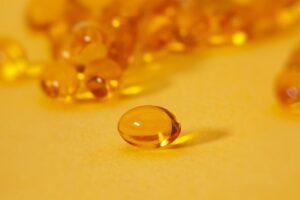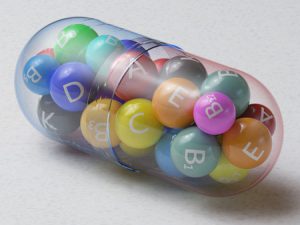
We all know that vitamin D is critical for good health, but how much to take is the real question.
Do you know how much you need?
Most everyone can get enough vitamin D from sunlight, but now-a-days, people aren’t getting outdoors enough, so they need to add food or supplements rich in vitamin D to their daily routine.
The Sun, Food, and Supplements
The Sun

The right amount of sunlight is an individual need, and it depends on what latitude in the world you live, the time of year, the time of day, and your skin color.
- the closer to the equator, the more direct the sun’s rays are;
- the sun is typically the strongest between 11:00 AM and 3:00 PM;
- you can stay outdoors longer in the colder months, and less hours in the hotter months;
- lighter skin has less melanin to make vitamin D, but it makes it faster;
- darker skin has more melanin and protects you more from UV rays, but it takes longer to make vitamin D.
Food
Even though food contains small amounts of vitamin D, it is an important nutrient for your health.
- supports your immune system;
- supports the nerves in your brain;
- assists in muscle movement;
- helps your body absorb calcium for strong bones, gums, and teeth.

Supplements
Your body can only make a certain amount of vitamin D at one time, so if you do not get enough sunshine daily, consider supplementing with extra vitamin D.
As with most all supplements, the RDA is typically low, but it is determined to be a safe average for consumers of all ages and health conditions. As with most everything, individualize your needs and be cautious when increasing the dosage.
For adults, the Endocrine Society guidelines recommend a daily intake of 1,500–2,000 IU to restore vitamin D levels. People with vitamin D deficiency can take up to 50,000 IU weekly instead of taking a daily dose.
The recommended dietary intake is in International Units (IU). The Food and Nutrition Board (FNB) recommends the following intake per day to maintain a healthy level of vitamin D:
| Age | Recommended daily intake of vitamin D |
| 0 to 12 months | 400 IU |
| 1 to 70 years | 600 IU |
| 70 years and above | 800 IU |
COVID

Any alternative to fighting COVID or to refusing the vaccine is controversial these days. But studies are out there that show the benefits of alternative protocols to help prevent COVID and to take after you have gotten the vaccine (if you chose to get the jab).
Vitamin D is one of the most important nutrients to strengthen your immune system when preventing a cold or the flu, so hence, it works the same way with the Beer Bug.
A study published in JAMA found that higher levels of vitamin D can lower your risk of infection, especially in people with darker skin (more melanin).
The adult RDA for vitamin D is 600 to 800 international units (IUs), but the National Academy of Medicine determined that up to 4,000 IUs per day is safe for most people. They also stated that there’s an association between vitamin D levels and COVID-19, and taking a daily vitamin D supplement can help prevent COVID and decrease the severity of its symptoms if you do get it.
So to prevent COVID and help prevent problems after the jab, many people increase their levels to 10,000 IUs per day.
Stay safe, get some sunshine, and keep a bottle of vitamin D in your cupboard.
_____________________________
If you want to learn more about health and disease prevention, contact me at janethull.com. Remember that you are never alone when you are looking for good health!
Gain access to all of my online programs, ongoing support, monthly Q&A, and more. I look forward to supporting you on your journey to alternative health and wellness.
_____________
Disclaimer: This article is for informational purposes only, and is educational in nature. The FDA may not have evaluated some of the statements. This article is not intended to diagnose, treat, cure, or prevent any disease. Please discuss with your own, qualified health care provider before adding supplements or making any changes to your dietary program.
Before taking vitamins, consult your doctor; pre-existing medical conditions or medications you are taking can affect how your body responds to multivitamins.
You have our permission to reprint this article if you attribute us with a live back-link to this article and the youtube links. https://janethull.com/